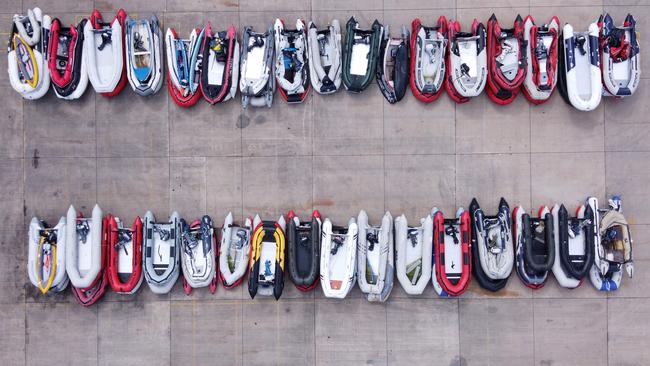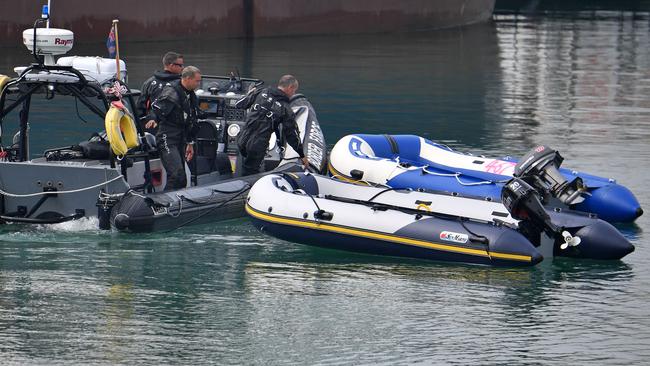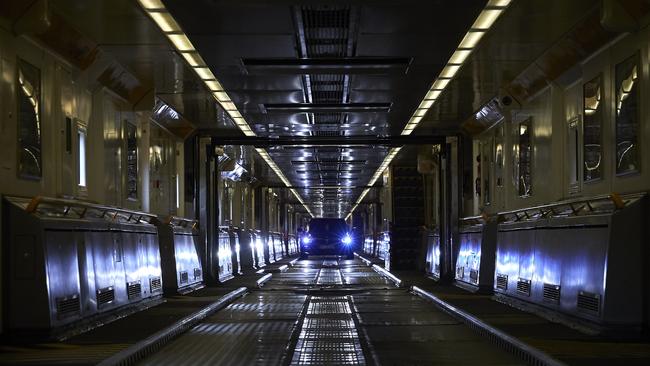UK’s gunboat diplomacy leaves entente cordiale all at sea
Paris-London relations have sunk to a new low — fuelled by a war of words over migrants trying to reach Britain in small boats.

It was not just British visitors to France facing a sudden end to their holidays who were unhappy with the UK’s imposition of quarantine on Saturday.
Prime Minister Boris Johnson’s move was also a blow to the prestige of Emmanuel Macron’s government, which is already under fire at home for its handling of COVID-19. “If a symbol of the worsening epidemic in France was needed, Britain provided it,” observed Le Monde.
The decision came at the end of a week in which relations between Paris and London sank to a new low — fuelled by a war of words over a different sort of cross-Channel traveller: migrants trying to reach Britain in small boats.
The call by Home Secretary Priti Patel to deploy warships to stem the flow of migrants was greeted by a rolling of eyes.
Calais Mayor Natacha Bouchart called it “a declaration of maritime war”. Her views were echoed by Xavier Bertrand, the ambitious centre-right president of Hauts-de-France, a large northern region including the coast, who plans to stand against Mr Macron in 2022.
“The English have a nerve!” Mr Bertrand told Le Figaro. “They complain that France is not doing enough, but it is they who lure the migrants with their lax legislation. And it is the inhabitants of our coast who suffer the consequences.”

Little appeared to come out of crisis talks held in Paris last week by junior immigration minister Chris Philp. Overshadowing everything are the talks on a post-Brexit trade deal — due to resume on Tuesday. Paris has been taking an especially hard line.
Yet despite their tough talk, the French are genuinely keen to develop close relations on military and security matters with Britain, which is seen in Paris as the only other member of the EU able and willing to develop a political role that goes beyond Europe. Germany, its only other potential ally, may be Europe’s dominant economic force, but is, for obvious historical reasons, reluctant to use military might. “The UK and France are the two only European powers able to explain to their European allies, either within the EU or within NATO, that there is a world east of Suez,” said Thomas Gomart, director of the French Institute of International Relations.
Key to this relationship are the Lancaster House treaties on defence and security co-operation, signed in 2010. Marking the treaties’ 10th anniversary this November could send an important signal, Dr Gomart believes.
Yet, according to Charles Grant, director of the Centre for European Reform, Mr Macron seems convinced he can still take a tough line at the post-Brexit trade talks.
“The French want to have their cake and eat it,” said Mr Grant. “When I say to the French, ‘Look, if you give the British a bum deal on trade, don’t expect them to be so keen to co-operate on security’, they say: ‘Of course, they’ll co-operate. Absolutely. They’ve got nowhere else to go.’ But the politics may not work that way.”

Elvire Fabry, a senior research fellow at the Jacques Delors institute, a Paris-based think tank, believes the row over immigration provides a foretaste of the kind of cross-Channel “blame games” and “mistrust” that will be a feature of political life post-Brexit.
“Franco-British relations are under severe pressure,” she said. Immigration is only one of many issues London sees as Anglo-French that will be caught up in the UK’s broader ties with Europe.
As the talks with the EU head towards what could be their toughest final stages, ideas for linkage and leverage are being bandied about. There were suggestions in Brussels last week that the EU might agree to take back failed asylum seekers who have made it across the Channel, but only in return for greater access for its fishermen to UK waters. Asylum could also be linked with the extent to which Britain is prepared to continue to be bound by Europe’s rules on state aid.
For Dr Gomart, though, the crucial problem faced not just by France but by the EU as a whole is to understand what Britain wants, which requires Mr Johnson to come up with a coherent definition of how he sees his country’s new place in the world in coming years.
“For Britain, Brexit is a major issue and will continue to be so for the next decade,” said Dr Gomart. “But for the EU that is not the case: it’s certainly an issue, but not the most important one. Like a divorce, it’s unpleasant but it’s something that should be done the sooner the better.”
The Sunday Times



To join the conversation, please log in. Don't have an account? Register
Join the conversation, you are commenting as Logout